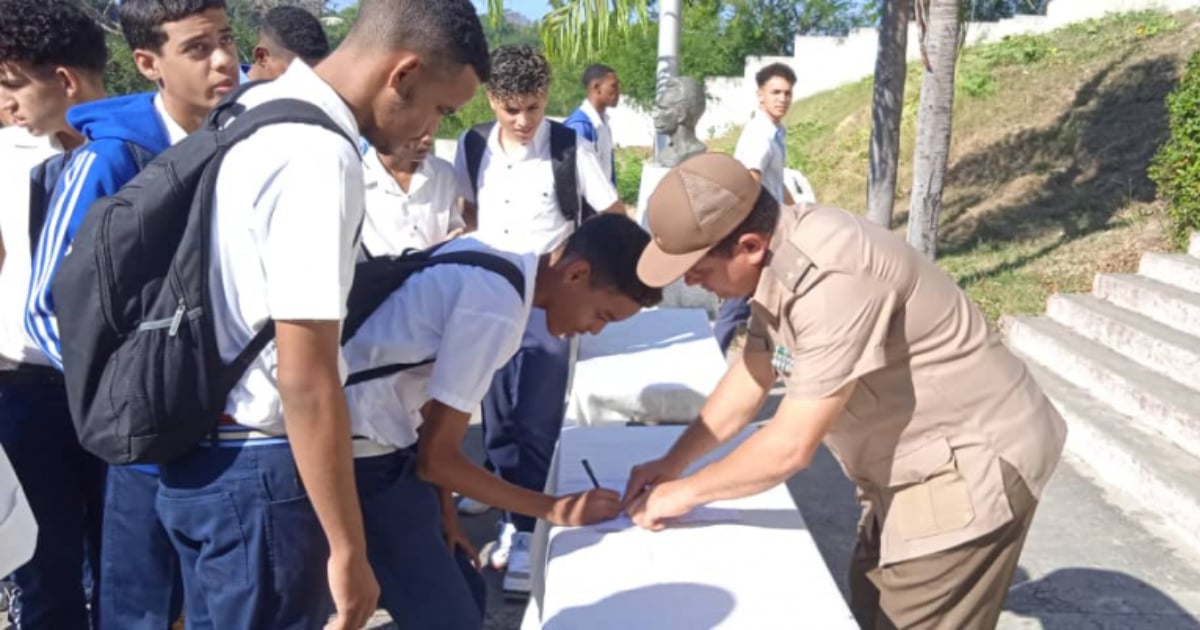
The Cuban regime approved new sanctions for young people who do not comply with military service, with hefty fines that can also affect adult family members.
The Official Gazette of the Republic of Cuba published this Wednesday Decree 103/2024, which establishes the new sanctions and offenses related to mandatory military service.
This regulation, issued by the Council of Ministers, replaces Decree 164/1991 and aims to update the administrative sanctions imposed on those who fail to fulfill their military duties, strengthening control over enlistment and participation in defense activities in Cuba.
The offenses included in this decree are not of a criminal nature, but administrative. The violations, which do not involve prison sentences nor are judged in courts, can become crimes only if the offender decides not to comply with the imposed sanction.
Fines for citizens who do not register for military service upon turning 16, fail to appear before the Military Committee when summoned, or do not participate in military service preparation activities range from 2,500 to 7,000 Cuban pesos.
Specifically, those who do not show up when summoned by the Military Committee will have to pay between 5,000 pesos and 7,000 pesos and assume the immediate obligation to report to the corresponding center.
Additionally, those who are already part of the reserve and do not fulfill their obligations, such as attending defense activities in peacetime or in exceptional situations, will also be sanctioned.
Decree 103/2024 also states that the parents or guardians of minors will be responsible for the infractions committed by them, which expands the scope of the penalties.
This aims to ensure that young people fulfill their obligations from the initial registration to their participation in military service.
The imposed sanctions are not limited to fines. There is also a "duty to act," which means that the offender can be required to comply with the provisions they ignored, such as appearing before the Military Committee or participating in defense activities.
If the sanctioned individual does not comply with this obligation, the competent military authority may initiate criminal proceedings.
Fines can be reduced by 25% if paid within three working days after the notification of the sanction. Those who wish to appeal the sanctions can do so before the head of the Provincial Military Committee or, as a last resort, before the head of the Military Region.
Decree 103/2024 not only establishes a system of administrative sanctions but also interacts with the Cuban Penal Code.
In its article 214, this code typifies the crime of "Violation of duties inherent to military service," which can carry penalties of up to one year in prison. This creates a system of double sanction, where the failure to meet military obligations can result in either an offense or a criminal act, depending on the severity of the infraction and the behavior of the offender.
The decree is published in the context of growing public rejection of Mandatory Military Service (SMO) in Cuba.
In recent years, social media has witnessed a proliferation of campaigns against the forced enlistment of young people, especially after the tragic fire at the Supertankers Base in Matanzas, where several recruits lost their lives while performing firefighting tasks.
Organizations like Cubalex and public figures such as artists and activists have denounced the dangers and abuses to which young Cubans are subjected during their service.
Decree 103/2024 seeks to tighten the sanctions for non-compliance with military service in Cuba, in an effort to maintain control over the obligations of citizens.
However, amidst the growing public discontent, these measures could further fuel rejection towards a practice that many consider outdated and dangerous.
What do you think?
COMMENTFiled under: